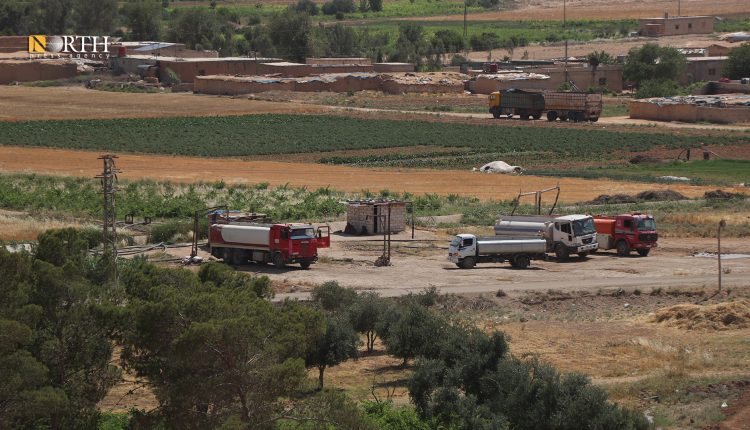
By Samer Yassin
HASAKAH, Syria (North Press) – As temperatures soar, Ramadan al-Hamrat, a resident of the Salahiyah neighborhood in the city of Hasakah, northeastern Syria, waits to fill a few plastic containers with salty water from a shared neighborhood tank. He says with sorrow, “This water is not drinkable, but it is all we have.”
Since 2019, after Turkey and its affiliated armed factions, aka the Syrian National Army (SNA), took control of the city of Sere Kaniye (Ras al-Ain) in northern Hasakah, the water supply to Hasakah has been cut more than 28 times, according to data from the Autonomous Administration of North and East Syria (AANES) and UN agencies. Despite repeated mediation efforts, a lasting solution has yet to be found.
People speculate that the agreement between the Syrian Democratic Forces (SDF) and Damascus may finally lead to the resumption of operations at the Alouk Water Station, the only source of drinking water for Hasakah residents.
Unbearable cost
Ramadan al-Hamrat, a daily wage laborer in Hasakah, says he is forced to spend between 35,000 and 40,000 Syrian pounds weekly to secure the bare minimum of clean water for his household.
For the past two years, access to clean water has become a daily struggle, not just for al-Hamrat but for thousands of residents in Hasakah, a city plagued by chronic thirst and a lack of tangible solutions.
“We suffer from a severe shortage of water, especially clean drinking water. Salty water is available in the neighborhood, but it cannot be used for drinking. Clean water, however, is very expensive, and yet we are forced to buy it because it’s a basic necessity,” al-Hamrat told North Press.
“I work for daily wages and my income is extremely limited, especially with the current market stagnation. The cost of water alone is a huge burden,” he added.
He also noted how the lack of water impacts general hygiene. “A house without water cannot stay clean. Dirt and germs will spread constantly.”
Al-Hamrat called on responsible authorities and international organizations to step in and resolve the water crisis in Hasakah, and to restart the Alouk station. “This is a humanitarian crisis that has nothing to do with any military or political party,” he stressed.
The Alouk Water Station, located east of Sere Kaniye (Ras al-Ain) in northeastern Syria, is the sole drinking water source for the city of Hasakah and its surroundings. It has been nearly completely out of service since late June 2023, when the AANES declared the city a “disaster zone” due to the total water cutoff.
Limited income, scarce water
Shihab al-Mismar, a resident of rural Hasakah, faces the same crisis. Due to the ongoing water cuts, he is forced to buy water tanks costing between 50,000 and 60,000 Syrian pounds—a sum far beyond his daily income of just 20,000 Syrian pounds.
He described the water situation as “extremely dire,” noting that even salty water, unfit for drinking, has become scarce, especially as surface water levels have dropped due to last year’s drought.
“With no job opportunities and no steady income, I cannot keep buying water regularly. This affects everything—washing clothes is delayed for days, and bathing becomes rare. This could lead to the spread of diseases,” he said.
He expressed hope that the Alouk station would be reactivated soon and called for a comprehensive solution, especially in light of recent positive developments in the region.
Abdulrahman Ali, a displaced person from Aleppo who has lived in Hasakah for 14 years, also shared his daily struggle to secure drinking water for his family. He said he’s forced to purchase five-barrel tanks for about 35,000 Syrian pounds.
“We buy water constantly, and this greatly affects my daily expenses. I work just to provide for my family, and if water were available regularly, I could spend that money on rent or other necessities,” Ali told North Press.
“Our suffering due to the water crisis is beyond words. We purchase all the water we use. In some months, we spend up to 150,000 Syrian pounds just on water—on top of other household expenses.”
Plea before disaster
Youssef Mamdouh, another Hasakah resident, emphasized the urgent need for a resolution to the city’s water crisis. He believes the best solution is either to pump water from the Euphrates River or to restart the Alouk station.
“We deal with water cuts every day and have to buy it with money. That forces us to ration every drop so it lasts as long as possible. As daily laborers, we rely on what we earn to provide water for our homes.”
He concluded with a plea: “No one should have to be tested in their access to water. We call on the Syrian government to restore water to the city immediately.”
Although an agreement was signed on March 10 between transitional president Ahmad al-Sharaa and SDF’s Commander in Chief, Mazloum Abdi, in Damascus—stipulating the formation of joint committees to resolve service-related issues, including the return of refugees and the reactivation of public institutions—there has been no visible change on the ground in Hasakah as of early June.
Last Sunday, Damascus hosted the first official meeting between the AANES delegation and the Syrian transitional government, discussing security and education issues, particularly in Aleppo. While these talks are seen as a positive step toward broader solutions, hopes in Hasakah remain pinned on whether the critical issue of water will be prioritized in upcoming discussions.
Observers stress that restarting the Alouk station is an urgent humanitarian necessity—not just a point of negotiation—and call for making Hasakah’s water crisis a top priority in any future dialogue, before the situation spirals into a full-blown catastrophe.
